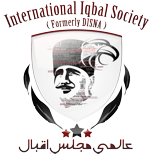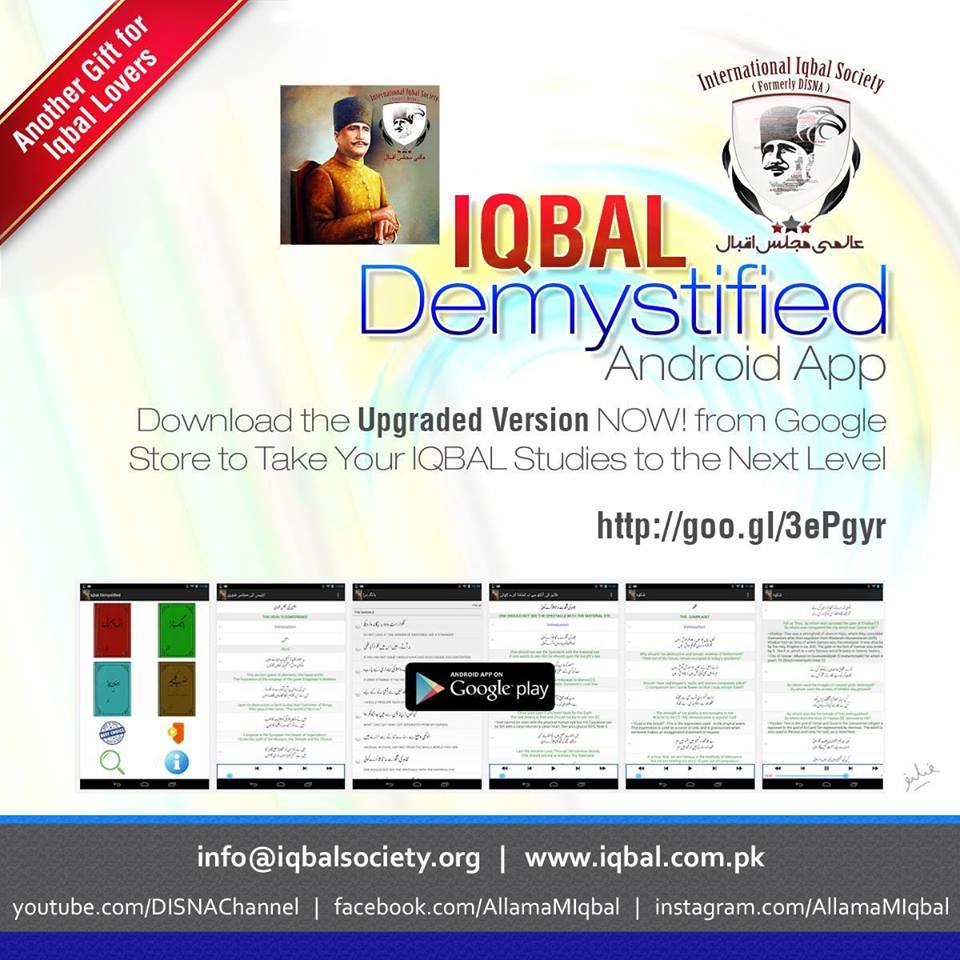Time line
- 1877: Born at Sialkot (present-day Pakistan) on Friday, November 9, 1877. Kashmiri origin.

- 1893–1895: High School and Intermediate – Scotch Mission College, Sialkot.
- 1897: B.A. (Arabic and Philosophy) – Government College, Lahore. Awarded Jamaluddin Gold Medal for
securing highest marks in Arabic, and another Gold Medal in English.
- 1899: M.A. (Philosophy) – Government College, Lahore. Secured first rank in Punjab state and awarded Gold
Medal. Reader in Arabic, Oriental College, Lahore.
- 1900: Read his poem "Nala-e-Yateem" (Wails of an Orphan) at the annual function of Anjuman-e-Himayat-e-
Islam at Lahore.
- 1901: Poem "Himala" published in Makhzan.
Assistant Commissioner's Examination (didn't qualify for medical reasons).
- 1903: Assistant Professor, Government College, Lahore.
Published his first book, Ilm Al-Iqtisad (Study of Economics), Lahore.
- 1905: Traveled to England for higher studies.
- 1907: Ph.D., Munich University, Germany (Thesis: The Development of Metaphysics in Persia).
- 1907–1908: Professor of Arabic, University of London.
- 1908: Bar-at-Law, London.
Returned to India.
Started law practice on October 22, 1908.
Part-time Professor of Philosophy and English Literature.
- 1911: Wrote and read famous poem "Shikwa" (Complaint) at Lahore.
Professor of Philosophy, Government College, Lahore.
- 1912: Wrote the epoch-making "Jawab-e-Shikwa" (Reply to Complaint).
- 1913: Wrote History of India for middle school students, Lahore.
- 1915: Published a long Persian poem "Asrar-e-Khudi" ("Secrets of Self").
Resigned from professorship to spread the message of Islam.
- 1918: In counterpart to Asrar-e-Khudi, published Rumuz-e-Bekhudi (Mysteries of Selflessness) in Persian.
- 1920: English translation of Asrar-e-Khudi by R.A. Nicholson, entitled Secrets of Self.
Visited Kashmir and presented his famous poem "Saqi Nama" at Srinagar.
- 1923: Awarded knighthood at Lahore on January 1, 1923. Published Payam-i-Mashriq (The Message of the
East) in Persian. It was written in response to Goethe's West-Ostlicher Divan.
- 1924: Prepared Urdu course material for Grade 6–7 students at Lahore. Published "Bang-e-Dara" ("Call of the
Caravan") in Urdu in March 1924.
- 1926: Elected to Punjab Legislative Council, Lahore (1926–1929).
- 1927: Published Zabur-i-Ajam in Persian.
- 1929: Delivered six lectures at Madras, Osmania University at Hyderabad, and Aligarh. He commented on the
latest scientific and philosophical developments of the 1920s in the light of Islamic teachings.
- 1930: President, All-India Muslim League. Elaborated on the idea of an independent Muslim state in his
presidential speech at Allahabad.
- 1931: Published Reconstruction of Religious Thought in Islam, a collection of six lectures, Lahore; also published
by Oxford University Press. Participated in Mo'tamar-A'lam-e-Islami (World Muslim Conference) in Palestine.
Participated in the Second Round Table Conference, London, September 7–December 31, 1931.
- 1932: Visited Paris and met French philosophers Bergson and Massignon. Bergson was astonished to hear his
remark on the Islamic concept of time. Published Javid Nama in Persian. It was a reply to Dante's Divine Comedy.
Participated in the Third Round Table Conference, London, November 17–December 24, 1932.
- 1933: Iqbal met Mussolini in Rome after Mussolini expressed his interest to meet him.
Visited Cordoba, Spain and wrote the poems "Dua" ("Supplication") and "Masjid-e-Qurtuba" ("The Mosque of Cordoba").
Served as Advisor to the Government of Afghanistan on higher education (October 1933).
Awarded Honorary D. Litt degree by Punjab University on December 4, 1933.
- 1934: "Musafir" ("Traveller") in Persian.
- 1935: Published Bal-e-Jibril in Urdu.
- 1936: Published Zarb-i-Kalim in April 1936, "Pas Che Bayad Kard" in Persian, and "Payam-e-Mashriq" in
September 1936.
- 1937: Ulema from Al-Azhar University visited Iqbal at Lahore.
- 1938: Jawahar Lal Nehru visited Iqbal at Lahore in January 1938.
Iqbal died at Lahore on April 21, 1938.
Armaghan-i-Hijaz, a collection of Urdu and Persian poems, published posthumously






